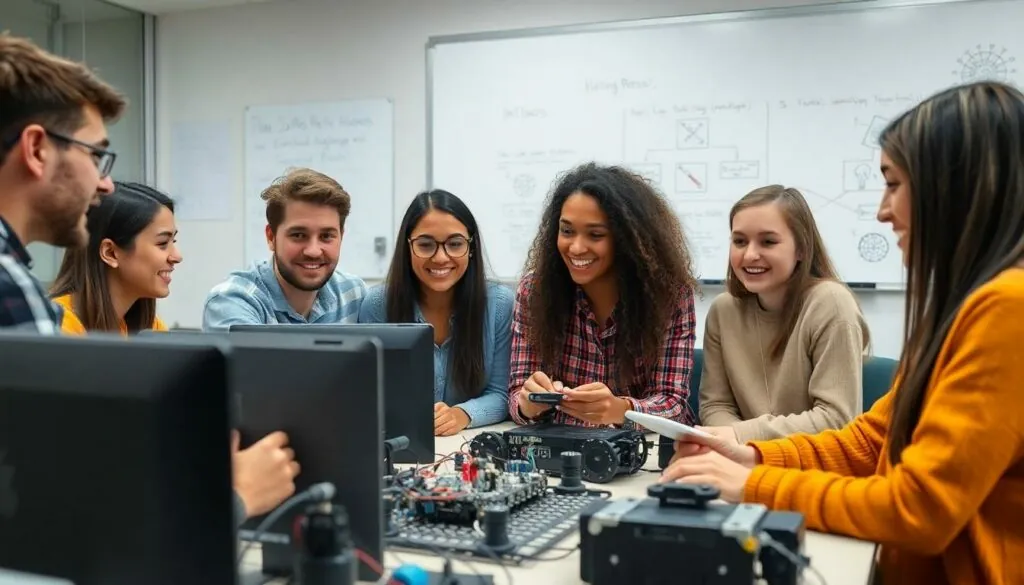Table of Contents
ToggleIn a world where robots might soon take over the coffee-making duties, students have a golden opportunity to dive into the fascinating realm of artificial intelligence. Imagine crafting projects that not only impress your teachers but also give you a sneak peek into the future. From chatbots that can hold a conversation better than your average roommate to smart systems that can predict the weather (or at least try), the possibilities are endless.
Overview of Artificial Intelligence Projects for Students
Artificial intelligence projects offer students practical experience with technology. Students can dive into building advanced chatbots that simulate real human conversations. Projects like these enhance programming skills and deepen understanding of natural language processing.
Predictive smart systems present another opportunity. Students gain insights into data analysis and machine learning by developing models that predict outcomes based on historical data. Real-world applications range from healthcare to finance.
Image recognition algorithms provide unique challenges. Creating systems that identify and classify images encourages students to explore computer vision techniques. Such projects let them experiment with convolutional neural networks.
AI-powered games stimulate creativity. Designing games that adapt to player behavior fosters critical thinking and problem-solving skills. Students can learn about reinforcement learning while creating responsive environments.
Collaborative projects bridge various disciplines. Students can work in teams to combine AI with art, music, or science, showcasing the interdisciplinary nature of technology. This approach highlights the importance of communication and teamwork in project development.
Online platforms and resources simplify the learning curve. Various tools offer accessible tutorials, libraries, and APIs for students at all levels. Beginners can start small, while advanced learners can tackle more complex challenges.
With numerous possibilities available, students have the chance to explore diverse aspects of artificial intelligence. Projects not only build technical skills but also nurture creativity and innovation. Each project serves as a step toward a deeper understanding of AI and its impact on future careers.
Benefits of Engaging in AI Projects

Engaging in AI projects offers numerous advantages for students eager to learn and innovate. Students can gain valuable insights and skills that enhance their academic and career prospects.
Skill Development
Students develop crucial skills through hands-on experience with AI projects. Building advanced chatbots enhances programming abilities and deepens understanding of natural language processing. Working on predictive smart systems fosters data analysis expertise and introduces machine learning concepts applicable in various fields. Students also explore image recognition algorithms, which sharpen their computer vision skills. Participating in AI-powered game development stimulates creativity and critical thinking. Each project challenges students to apply theoretical knowledge in practical scenarios while encouraging them to collaborate with peers and learn effective communication strategies.
Career Opportunities
Exploring AI projects broadens career opportunities for students. The demand for AI expertise is skyrocketing across numerous industries such as healthcare, finance, and technology. Students who engage in AI projects demonstrate hands-on experience, appealing to future employers. These projects showcase problem-solving abilities and innovative thinking, traits that organizations highly value. Networking with seasoned professionals during collaborative projects can lead to internships or job offers. Students position themselves as strong candidates in a competitive job market through practical experience. Additionally, proficiency in AI tools and concepts prepares them for advanced studies or career paths in artificial intelligence and related fields.
Popular AI Project Ideas for Students
Students can delve into various AI projects tailored to different skill levels. Engaging in these projects enhances learning and cultivates innovative thinking.
Beginner Level Projects
Beginners can start with chatbots using platforms like Dialogflow or Microsoft Bot Framework. Creating a simple Q&A chatbot introduces natural language processing principles. Students can also explore sentiment analysis by analyzing tweets or reviews, gaining insights into text data. Collecting public datasets for this project offers hands-on experience with data manipulation. Students can further experiment with linear regression to predict outcomes based on numerical inputs, laying the groundwork for statistical analysis in machine learning.
Intermediate Level Projects
Intermediate students might develop a recommendation system similar to those used by Netflix or Amazon. By utilizing collaborative filtering algorithms, students learn how similar users’ preferences shape recommendations. Integrating image recognition using TensorFlow lets students tackle real-world applications like classifying images. Analyzing datasets with tools such as Python’s Pandas aids in understanding data structures and cleaning methods. Building a simple game that adapitates to player strategies can also enhance programming skills while providing creative problem-solving opportunities.
Advanced Level Projects
Advanced projects may involve deploying machine learning models on cloud platforms like AWS or Google Cloud. Building a predictive model for stock prices requires understanding complex algorithms like time series analysis. Creating a neural network for image generation introduces students to deep learning concepts and involves working with frameworks such as Keras. Students might also consider developing an autonomous robot that navigates using computer vision and reinforcement learning, blending hardware and software skills. Such projects emphasize teamwork and communication while preparing students for real-world AI challenges.
Tools and Resources for AI Projects
Students can access various tools and resources to enhance their AI project experience. These resources simplify complex concepts and promote innovative learning.
Software and Programming Languages
Programming languages like Python and R rank highly for AI projects. Python, with libraries such as TensorFlow, PyTorch, and scikit-learn, provides a robust environment for machine learning and data analysis. R specializes in statistical computing and is suitable for projects involving data visualization. Java and C++ also support AI development, particularly in high-performance applications. Students should explore integrated development environments (IDEs) like Jupyter Notebook and PyCharm, which streamline coding processes. Utilizing GitHub allows for collaboration and sharing of code, fostering community engagement and knowledge exchange.
Online Courses and Tutorials
Students benefit significantly from online courses and tutorials designed for various skill levels. Platforms like Coursera, edX, and Udacity offer comprehensive courses on AI and machine learning. Topics range from introductory principles to advanced applications, providing structured learning paths. YouTube is another great resource, featuring tutorials that break down complex concepts into manageable segments. Hands-on projects complement theoretical knowledge, facilitating practical skill development. Engaging with forums and discussion groups enhances learning and encourages interaction with peers and industry professionals.
Tips for Successful AI Projects
Successful AI projects require clear objectives. Students must define their goals early to stay focused. Choosing the right tools simplifies the development process. Python, R, TensorFlow, and PyTorch remain popular and effective choices for creating AI applications.
Understanding the project scope is crucial. Students should break down complex tasks into manageable components. This approach allows for systematic progress while enabling troubleshooting at each step. Collaboration enhances learning experiences. Working with peers fosters teamwork and cultivates diverse perspectives on problem-solving.
Documentation plays an important role. Keeping detailed records of code and findings helps clarify methodologies and support future iterations. Engaging in online forums encourages sharing insights with a broader community. Discussing challenges with experienced professionals offers valuable guidance.
Emphasizing iterative testing creates reliable outcomes. Launching a basic version first enables feedback collection. Incorporating user feedback leads to improvements that increase project functionality. Setting deadlines for milestones promotes accountability and productivity.
Exploration and experimentation drive innovation. Students should feel free to modify approaches as they learn from their experiences. Gaining feedback through presentations enables refinement of ideas. Presenting projects enhances understanding and increases confidence in explaining complex concepts.
Lastly, seeking mentorship can enhance project success. Experienced professionals provide insights that benefit skill development and broaden networking opportunities. Implementing these strategies leads to more substantial AI projects, ultimately benefiting academic and career pursuits.
Exploring artificial intelligence projects opens a world of possibilities for students eager to innovate. These hands-on experiences not only enhance technical skills but also foster creativity and critical thinking. By engaging in diverse projects, students prepare themselves for a future where AI plays a pivotal role across various industries.
The collaborative nature of these projects encourages teamwork and communication, essential skills in today’s job market. With the right resources and tools, students can tackle challenges at their own pace, gaining confidence and expertise in AI. As they embark on this journey, they position themselves as valuable assets in a rapidly evolving technological landscape. Embracing AI projects today can lead to exciting career opportunities tomorrow.





